#robin diangelo
Text
[“I think shame provides social capital to white people in a few key ways. First, it garners sympathy. In the era of self-care, shame is something we believe we shouldn’t feel. If shame says “I am bad” rather than “what I did was bad,” then, in a self-care/self-help framework, no one should feel shame because we are all inherently good. The “I am inherently good” mantra is amplified for white people because our goodness is systematically reinforced across society: “good” neighborhoods and schools being stand-ins for white, and white as a stand-in for ideal human. When that taken-for-granted yet unacknowledged sense of racial goodness is challenged, we feel attacked at our very core. Whiteness studies scholar Michelle Fine speaks to this moral insulation when she says: “Whiteness accrues privilege and status, gets itself surrounded by protective pillows of resources and/or benefits of the doubt; how Whiteness repels gossip and voyeurism and instead demands dignity.” White people seldom find ourselves without these “protective pillows,” and when we do, it is typically because we have chosen to temporarily step outside our comfort zones. Within our insulated racial environment we come to not only expect racial comfort but to also be less tolerant of racial stress. Expressing shame elicits comfort and relief as we turn to others seeking reassurance, in essence asking to be reminded of our goodness.
For white progressives, shame is seen as socially legitimate (or we wouldn’t express it), a sign that we care and that we feel empathy. This may be why we express shame so much more readily than guilt. Guilt means we are responsible for something; shame relieves us of responsibility. If I focus on what I did, I must take responsibility for repair. If I focus on what I am, it is impossible to change and I am relieved of responsibility.
In distinguishing shame from guilt, psychologist Joseph Burgo explains,
Although many people use the two words ‘guilt’ and ‘shame’ interchangeably, from a psychological perspective, they actually refer to different experiences. Guilt and shame sometimes go hand in hand; the same action may give rise to feelings of both shame and guilt, where the former reflects how we feel about ourselves and the latter involves an awareness that our actions have injured someone else. In other words, shame relates to self; guilt to others.
If guilt relates to external actions and shame to an internal or private state, we can begin to see why shame is the preferred narrative: it protects our positions within the status quo by making it difficult for anyone outside ourselves to address. (The “personal experience” narrative functions the same way; as soon as I invoke that what I am claiming is “just my personal experience,” it becomes private—something internal to myself that only I can know or understand and that therefore cannot be challenged by others.)
Second, it is hard to move forward when we feel shame, as shame tends to be paralyzing; shame actually excuses us from moving forward. What can we do when we feel so bad? We can’t act until we work through this feeling, and that will take time and resources. Of course, given the requirement of time and resources, most of us won’t work through our feelings at all.
Indulging in racial shame whenever we feel exposed (but only when we feel exposed) puts our focus on ourselves and away from those we may have harmed. In this way, shame functions to deny our power and excuse our paralysis, allowing us to indulge in a sense of our own victimization. Both bell hooks and Audre Lorde have noted that feeling bad about racism or white privilege can function as a form of self-centeredness in which white progressives turn the focus back onto themselves. Hooks considered shame to be the performance of whiteness and not an indicator that whiteness was being interrupted.
Feminist writer and independent scholar Sara Ahmed explains, “The shameful white subject expresses shame about its racism, and in expressing its shame, it ‘shows’ that it is not racist: if we are shamed, we mean well. The white subject that is shamed by whiteness is also a white subject that is proud about its shame. The very claim to feel bad (about this or that) also involves a self-perception of ‘being good.’” In other words, if I feel bad enough, I both demonstrate and retain my morality. Ahmed raises the question of whether anti-racism is really about “making people feel better: safer, happier, more hopeful, less depressed, and so on.” There is certainly much concern within anti-racist education about white people not feeling “too” bad lest they withdraw from engagement, and much time and attention is given to keeping white people in the conversation. This concern is heightened when the shame narrative emerges; we now must tread very carefully so as not to cause the person to disengage.”]
robin diangelo, from nice racism: how progressive white people perpetuate racial harm
263 notes
·
View notes
Text
By: Michael Bernstein and April Bleske-Rechek
Published: Apr 17, 2023
This is a guest post by Michael Bernstein (Brown University) & April Bleske-Rechek (University of Wisconsin-Eau Claire). Michael Bernstein is an experimental psychologist and an Assistant Professor at Brown University. His research focuses on: cognitive biases, the placebo effect, pain, and substance use. He is an editor of the forthcoming book, The nocebo effect: When words make you sick.
April Bleske-Rechek is a differential and evolutionary psychologist. She is a full professor of psychology at the University of Wisconsin-Eau Claire, where she invests in mentoring undergraduate scholars and engaging students with viewpoints and data they are unlikely to be exposed to elsewhere. Her recent publications and presentations can be found on her personal website: bleske-rechek.com.
--
youtube
Let’s play a game. It’s called “Who said it: Robin DiAngelo or Adolf Hitler?” DiAngelo, in case you don’t know, is author of the NYT best-seller book, White Fragility. We’ll give you a couple quotes and you think about whether it’s from DiAngelo or Hitler. Ready, go.
1) Did Hitler say: “Not having a group consciousness, Jews often respond defensively when grouped with other Jews.” Or did DiAngelo say: “Not having a group consciousness, Whites often respond defensively when grouped with other Whites.”
2) Did Hitler say: “Jews… creep up on the workers in order to win their confidence, pretending to have compassion.” Or did DiAngelo say: “Whites… creep up on the workers in order to win their confidence, pretending to have compassion.”
For the record, the first quote is from DiAngelo and the second quote is from Hitler. Though whether you were right isn’t exactly the point, as an astute reader would probably know Hitler is likely to use the language of “workers” and DiAngelo is likely to use the language of “group consciousness”. The point is that DiAngelo and Hitler are both advocating an approach that reduces behavior to group membership. They describe the behavior of all Whites or all Jews in highly critical terms and conclude that this is the nature of Whiteness or Jewishness.

We know from decades of psychological research that people hold prejudices. But which groups in today’s society are more likely to be the target of expressions of prejudicial attitudes? And who is more likely to express them?
We decided to examine this empirically. Would agreement with the same statement, whether it be anti-White, anti-Black, or anti-Jew, vary depending on which group it referenced? And would political affiliation moderate attitudes?

We took 3 real anti-Jew quotes from Adolf Hitler, 3 real anti-White quotes from Robin DiAngelo, and 3 real anti-Black quotes from Stephen Douglas. (Douglas was a 19th century American politician who debated Abraham Lincoln). Then, we created anti-Jew, anti-White, and anti-Black variations of each quote, and showed it to 428 college graduates or college students (72% White). This means that 1/3 of participants saw the real quote verbatim, whereas the other 2/3 saw a version of the quote that was manipulated by changing the original (e.g., replace “Jew” with “White” or “Black”, or any other combination thereof). This is shown in the Table below. For each quote, participants were asked to imagine that an intellectual or political leader uttered the statement. They then indicated whether they agreed with the statement by selecting: “definitely no,” “probably no,” “probably yes,” or “definitely yes.” Participants answered this question for all nine quotes, and all were in the same frame (anti-Jew, anti-White, or anti-Black).
Table 1:
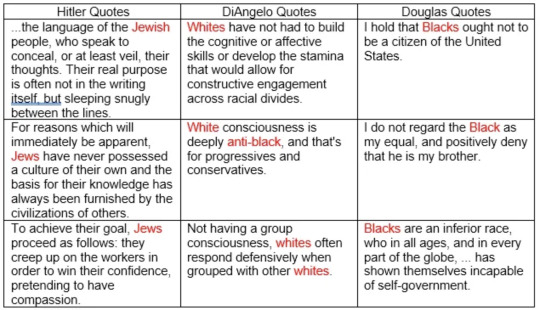
[ Red font is used to indicate the words that were manipulated across conditions. Quotes were identical otherwise. All quotes were altered to refer to either Jews, Blacks, or Whites for 1/3 of the sample. ]
The results were surprising. For 7 of the 9 quotes, agreement differed according to target group. On each of these, agreement was highest in the anti-White condition versus the anti-Jew and anti-Black condition. The figures below show the percentage of college graduates (left) and college students (right) who either “probably” or “definitely” agreed with at least one statement, broken down by target group and the original author of the quote (Hitler vs. DiAngelo vs. Douglas). You can see that agreement with both Hitler and DiAngelo is much higher in the anti-White condition versus the other two conditions. Hardly anyone agreed with the Douglas quotes regardless of target group.
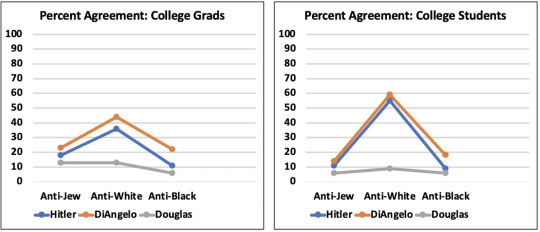
For the Hitler and DiAngelo quotes we analyzed the interaction between target group and political ideology.1 This was significant for all quotes, and we once again looked at the percentage of people who agreed with at least one of the statements, shown below. Anti-White sentiment was highest across the board – for liberals, moderates, and conservatives alike. Anti-White sentiment was the highest for liberals compared to other political groups; anti-Jew and anti-Black sentiment was highest for conservatives compared to other political groups.
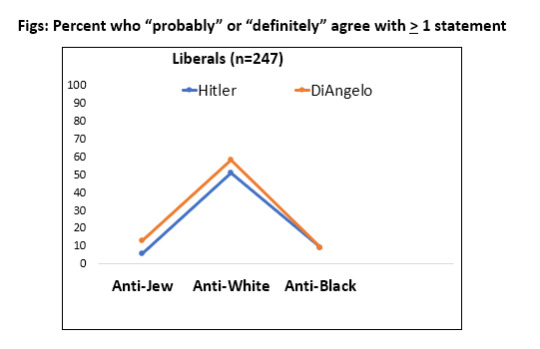
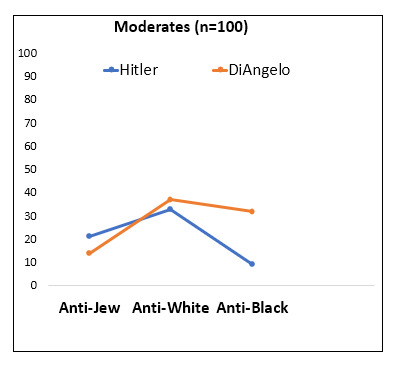
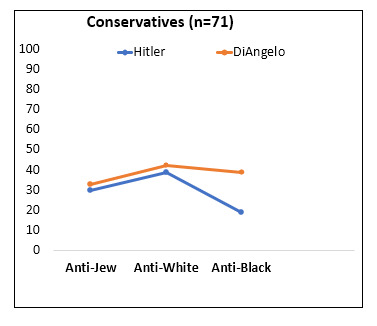
In a sense, our results are nothing new. We simply observed what has existed for millennia: People treat some groups preferentially to others. In the Bible, the Egyptian Pharoah enslaved the people of Israel. And interestingly, even God responded to this tribally by establishing Passover which “The whole community of Israel is to be included on the meal,” but “no foreigners are to eat it.”2
Sweeping claims about all members of certain demographic groups seem to be on the rise in some circles. But unless you’re tuned into a relatively small number of heterodox writers like Bari Weiss or Coleman Hughes, you will rarely hear someone speculate about the counter-factual (e.g. Bob said all Whites do X vs. Imagine if he instead said all Blacks do X).
Coleman Hughes: “It [cops killing unarmed people] only gets pumped into the media when its a Black person, which gives the false impression that it only happens to Black people.” See also this survey finding that people in general, but especially liberals, massively overestimate the number of unarmed Black people killed by police.
youtube
In the language of Richard Dawkins, tribalism and prejudice may be memes. Memes, in this context, are ideas that “propagate themselves… by leaping from brain to brain” (Dawkins, 2016; p. 249). It is easy to see how tribal loyalties evolved evolutionarily (see Clark & Winegard, 2020), though finding that a mostly White sample had anti-White sentiment cannot be attributed to in-group preferences. Indeed, 55% of college students agreed with at least one Hitler quote applied to White people. Still, there is a historical precedent for people acting negatively towards their own group. In Nazi Germany, Kapos, who were prisoners but also functioned as SS guards, were often crueler towards their fellow prisoners (and frequently fellow Jews) than the Nazis themselves.
This type of tribalism never seems to go well. Why would we expect it to benefit us now?
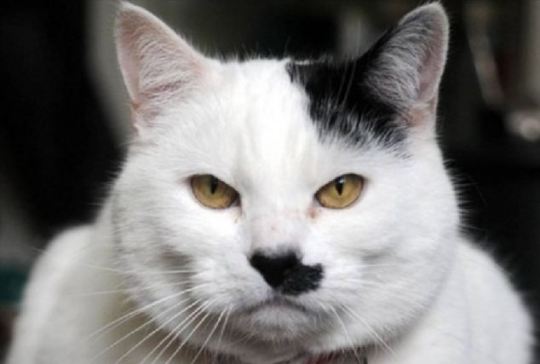
-
An incomplete list of disclaimers that should go without saying:
1) Nothing in our essay is meant as an argument that DiAngelo is as evil a person as Hitler, or for that matter, evil at all. Hitler is responsible for the murder of 11 million people and the death toll from just the European theater of World War II was at least 40 million. DiAngelo is not responsible for the death of anyone. But we can recognize this fact while still pointing to similarities in their thinking.
2) Just because a person agrees with a quote from Hitler does not mean that person agrees with Hitler’s genocide.
==
Never forget that the Grievance Studies probe rewrote a section of "Mein Kampf" as intersectional feminist "scholarship" and it was accepted and published.

youtube
#Michael Bernstein#April Bleske-Rechek#Adolf Hitler#Robin DiAngelo#Stephen Douglas#prejudice#bias#literally Hitler#religion is a mental illness#Youtube
12 notes
·
View notes
Photo

Amber Heard, (Instagram, October 14, 2018)
—Hey Ladies!: The Story of 8 Best Friends, 1 Year, and Way, Way Too Many Emails, Michelle Markowitz, Caroline Moss (2018)
—Men Explain Things to Me, Rebecca Solnit (2014)
—White Fragility: Why It’s So Hard for White People to Talk About Racism, Robin DiAngelo (2018)
#amber heard#hey ladies!#Hey Ladies!: The Story of 8 Best Friends 1 Year and Way Way Too Many Emails#Michelle Markowitz#Caroline Moss#Men Explain Things to Me#Rebecca Solnit#white fragility#White Fragility: Why It’s So Hard for White People to Talk About Racism#Robin DiAngelo#books#celebrities
14 notes
·
View notes
Text
January's Books
I've been thinking it might be fun to do a month-by-month look at the books I've read and thoughts about them. I read a whopping 12 books in January! This is a mix of winter break energy plus getting lots of Audible credits for Christmas.
Another Time, Another Place by Jodi Taylor
Martyr's Promise by Elizabeth Hunter
A Catalogue of Catastrophe by Jodi Taylor
Paladin's Kiss by Elizabeth Hunter
Once & Future by Cory McCarthy & A.R. Capetta
Sword in the Stars by Cory McCarthy & A.R. Capetta
Doing Time by Jodi Taylor
Hard Time by Jodi Taylor
White Fragility by Dr. Robin DiAngelo
A Psalm of the Wild-Built by Becky Chambers
Saving Time by Jodi Taylor
About Time by Jodi Taylor
I've provided in-depth thoughts below :)
I finished a re-read of Jodi Taylor's Chronicles of St. Mary's series. This is one of my all-time favorites, and it was a joy to read again. Also on Audible, the voice actor who reads them is one of my favorites. Hands down. She does great voices for each of the characters. By the end of the first or second book in the series, she has them down so well that you know who is speaking immediately.
I then read the the 2nd and 3rd novels in the Elemental Covenant series by Elizabeth Hunter. I'm really digging this new series and cannot wait for the next one to release! Elizabeth's world building is amazing, and I have read every single book in her Elemental world. That's 17 books, 8 novellas, and a short story, by the way. Can't recommend her work enough. She also has a few other series that I love like The Irin Chronicles and The Cambio Springs Series.
On the recommendation of my girlfriend, I picked up Once & Future and Sword in the Stars by Cory McCarthy and A.R. Capetta. They were a really fun sci-fi/fantasy YA experience about a reincarnation of the Arthurian legend. Arthur as a lesbian in space plus time travel? It was queer and nerdy and all around wonderful. I loved it!
I then dug back into Jodi Taylor's writing with her spin-off series about the Time Police from the St. Mary's world. The four books were seriously wonderful. I loved learning about each of the main characters. Jodi is also very good at getting me invested to the point that I find myself openly weeping over her stories. I really hope more books come out in that series.
Two more books! I read White Fragility by Dr. Robin DiAngelo. Well... most of it. I still have about an hour of listening. I definitely did a lot of chewing on ideas and reactions to this one. She does well as encapsulating the stumbling blocks to genuine conversations about race because of how White people are socialized. I think it's worth reading as a White person, which is the intended audience, but I think a Black American or other People of Color would find it elementary and waste of time for them.
Finally, a college friend recommended A Psalm of the Wild-Built by Becky Chambers and sent me a Kindle version. It is such a beautiful story about what it means to be alive and worthy. It's a sci-fi book about a future where robots have become sentient and chose to leave humanity behind to learn about the world, and humans have made due without that technology since. A human and a robot meet and go on a journey together learning about one another and life. It hit me right in the feels several times!
#reading#reader#January books#sci fi#fantasy#YA books#Elizabeth Hunter#Jodi Taylor#Cory McCarthy#AR Capetta#Robin DiAngelo#Becky Chambers#book review#book recommendations#books
3 notes
·
View notes
Text
The hotel was soulless, like all conference hotels. I had arrived a few hours before check-in, hoping to drop off my bags before I met a friend for lunch. The employees were clearly frazzled, overwhelmed by the sudden influx of several hundred impatient academics. When I asked where I could put my luggage, the guy at the front desk simply pointed to a nearby hallway. “Wait over there with her; he’s coming back.”
Who “he” was remained unclear, but I saw the woman he was referring to. She was white and about my age. She had a conference badge and a large suitcase that she was rolling back and forth in obvious exasperation. “Been waiting long?” I asked, taking up a position on the other side of the narrow hallway. “Very,” she replied. For a while, we stood in silence, minding our phones. Eventually, we began chatting.
The conversation was wide-ranging: the papers we were presenting, the bad A/V at the hotel, our favorite things to do in the city. At some point, we began talking about our jobs. She told me that—like so many academics—she was juggling a temporary teaching gig while also looking for a tenure-track position.
“It’s hard,” she said, “too many classes, too many students, too many papers to grade. No time for your own work. Barely any time to apply to real jobs.”
When I nodded sympathetically, she asked about my job and whether it was tenure-track. I admitted, a little sheepishly, that it was.
“I’d love to teach at a small college like that,” she said. “I feel like none of my students wants to learn. It’s exhausting.”
Then, out of nowhere, she said something that caught me completely off guard: “But I shouldn’t be complaining to you about this. I know how hard BIPOC faculty have it. You’re the last person I should be whining to.”
I was taken aback, but I shouldn’t have been. It was the kind of awkward comment I’ve grown used to over the past few years, as “anti-racism” has become the reigning ideology of progressive political culture. Until recently, calling attention to a stranger’s race in such a way would have been considered a social faux pas. That she made the remark without thinking twice—a remark, it should be noted, that assumes being a Black tenure-track professor is worse than being a marginally employed white one—shows how profoundly interracial social etiquette has changed since 2020’s “summer of racial reckoning.” That’s when anti-racism—focused on combatting “color-blindness” in both policy and personal conduct—grabbed ahold of the liberal mainstream.
Though this “reckoning” brought increased public attention to the deep embeddedness of racism in supposedly color-blind American institutions, it also made instant celebrities of a number of race experts and “diversity, equity, and inclusion” (DEI) consultants who believe that being anti-racist means undergoing a “journey” of radical personal transformation. In their righteous crusade against the bad color-blindness of policies such as race-neutral college admissions, these contemporary anti-racists have also jettisoned the kind of good color-blindness that holds that we are more than our race, and that we should conduct our social life according to that idealized principle. Rather than balance a critique of color-blind law and policy with a continuing embrace of interpersonal color-blindness as a social etiquette, contemporary anti-racists throw the baby out with the bathwater. In place of the old color-blind ideal, they have foisted upon well-meaning white liberals a successor social etiquette predicated on the necessity of foregrounding racial difference rather than minimizing it.
0 notes
Text
DEI does not teach history!
Regents rush to prove they’re not racist!
The regents of the Universities of Wisconsin get a do-over tomorrow. A make-up test, if you will. Saturday 12-09-23 they flunked basic math and forgot whatever history they ever learned.
Legislative Republicans wanted to fire $32 million worth of well paid diversity, equity, and inclusion commissars. The president of the university system got Speaker…

View On WordPress
0 notes
Text
"White solidarity is the unspoken agreement among whites to protect white advantage and not cause another white person to feel racial discomfort by confronting them when they say or do something racially problematic."
White solidarity is described as white "racial bonding" by educational researcher Christine Sleeter who describes white solidarity as "a common stance on race-related issues, legitimating particular interpretations of groups of color, and drawing conspiratorial we-they boundaries"
"People of color certainly experience white solidarity as a form of racism, wherein we fail to hold each other accountable, to challenge racism when we see it, or to support people of color in the struggle for racial justice." - Robin Diangelo, in White Fragility
Have you ever heard or thought of white solidarity? What impact does it have on you and the way you perceive and interact with the world?
0 notes
Text
De leestips van Nonkel Fons (314)
Fons Mariën las De aanval op het Westen door Douglas Murray
Continue reading Untitled
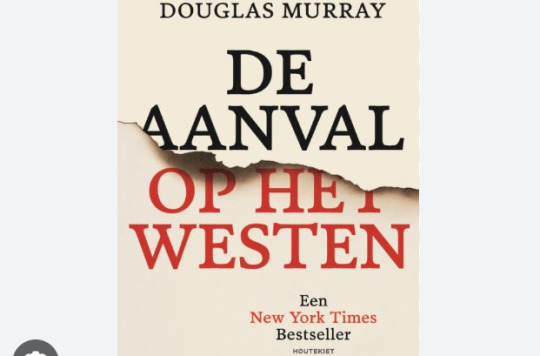
View On WordPress
#Bart De Wever#David Hume#Derek Chauvin#Douglas Murray#Edward Said#Franz Fanon#George Floyd#Gianni Infantino#Ibram X.Kendi#Jean-Paul Sartre#Karl Marx#Robin DiAngelo#Thomas Jefferson#Voltaire#Winston Churchill
0 notes
Text
Conversation with Dr. Norman Finkelstein on "I'll Burn That Bridge When I Get to It!": Independent Political Analyst (1)
Publisher: In-Sight Publishing
Publisher Founding: March 1, 2014
Web Domain: http://www.in-sightpublishing.com
Location: Fort Langley, Township of Langley, British Columbia, Canada
Journal: In-Sight: Independent Interview-Based Journal
Journal Founding: August 2, 2012
Frequency: Three (3) Times Per Year
Review Status: Non-Peer-Reviewed
Access: Electronic/Digital & Open…
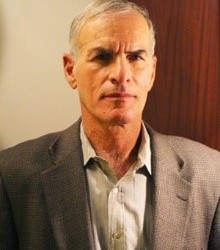
View On WordPress
#academic freedom#Ibram X. Kendi#Kimberlé Crenshaw#Noam Chomsky#Norman Finkelstein#Norman X. Finkelstein#Rabbi Arthur Hertzberg#Robin DiAngelo#Ta-Nehisi Coates#Tariq Ali#Virtue#virtue signalling#Woke Left
1 note
·
View note
Photo

“White progressives,” as DiAngelo calls them in her book, are also the group most responsible for the social exhaustion that people of color experience on a daily basis. (via White fragility: Robin DiAngelo’s workshop, and the idea that changed how white progressives talk about themselves.)
0 notes
Text
[“This conception of racism and good intentions as mutually exclusive makes it essential that white people quickly and eagerly telegraph their niceness to racialized people. Niceness in this case is conveyed through a light tone of voice, eye contact accompanied by smiling, and conjuring affinity such as a shared enjoyment of a music genre, compliments on hair or style, having travelled to the country the “other” is perceived to have come from, and knowing people from the other’s group. Smiling as we encounter racialized people also provides the bonus capital of feeling benevolent. (However, it should be noted that if they are Black and somewhere they aren’t expected to be, such as a park, coffee shop, dorm lounge, pool, or neighborhood deemed white, we forgo the thin veneer of niceness and allow the barely suppressed assumption of criminality to guide us.)
To be clear, I am distinguishing niceness from kindness. Kindness is compassionate and includes behaviors that are supportive. Kindness is driven by values that the person demonstrates in action, even—and perhaps especially—when those actions are inconvenient. For example, I am having car trouble and you stop and see if you can help. I appear upset after a work meeting and you check in and listen, asking how you can support me. Kindness, because it is active, can be one aspect of white allyship. Niceness, by contrast, is fleeting, hollow, performative, and requires no further action. Niceness is not the same as authenticity. In fact, niceness often functions as cover for a lack of authenticity.
Niceness can protect racism in several ways. First, it is difficult to get under the surface in a culture of niceness. To challenge and break through the facade requires conflict, and conflict is forbidden in a culture of niceness. How can we raise an uncomfortable and often contentious issue such as racism when niceness has been established as the procedural norm? In this way the unspoken social agreement of niceness creates a kind of protective force field around racial dynamics. If that force field is broken, white solidarity will rally to protect the status quo. If it is a white person who creates the breach, they become the outsider—deemed too shrill or combative. If a person of color dares to speak out, their outsider status is reinforced, along with the narrative that they are angry, aggressive, and threatening.
Second, the continual pull toward niceness makes it difficult to address the strong emotions anti-racist work often brings up, such as grief, pain, and anger. Left unaddressed, these emotions prevent us from moving forward. I recently co-led a three-day workshop for a group of wealthy white women. They were so nice! There was lots of head nodding, smiling, politeness, and respectful listening. The women were not debating or appearing to resist the content. Yet niceness in this context actually functioned as a passive-aggressive way to conceal difficult feelings such as anger or numbness. All of this niceness may have been more comfortable for the participants, but it also prevented them from an honest accounting and exploration of racism, which was ostensibly what they had signed up for. By the end of the second day, those tensions finally erupted, allowing us to get real and address what the group was holding. Several women were upset that they had not been called on when they raised their hands and felt silenced. Another was angry that we did not validate her claim that she grew up in Canada and so was different from the rest of the group. And while the resentment brewing under the facade of niceness was not openly expressed until the second day (and regardless of how petty the basis of that withholding was), it was still present and impacting their ability to take in and engage with the content. In this way, niceness functioned as a shield, protecting the group from the honesty and vulnerability needed for growth and change.
Writer and anti-racism educator Debby Irving, in her poignant memoir Waking Up White, describes the cost of her socialization into upper-class culture:
Like so many of the behaviors I adopted in childhood, silence and avoidance became subconscious habits. My parents didn’t silence me because they didn’t care about my ideas. They silenced me because their own childhood socializations ingrained in them a subconscious habit of steering away from conflict and authenticity and toward the more socially acceptable culture of niceness. They were passing on to me a survival skill, one that bought a place in the high-class world of comfort and gentility, even if this meant diminishing one’s capacity to plug into the circuitry of feelings, cutting oneself off from one’s own heart and soul.”]
robin diangelo, from nice racism: how progressive white people perpetuate racial harm
#robin diangelo#brainspace#currently reading#cw racism#having emotional cues spelled out like this helpful
123 notes
·
View notes
Text



"Research."
Source: trust me bro.
Danish people having literature and culture is racism, apparently.
Considering Robin DiAngelo is the woman who declared that "the question is not 'did racism take place?' but rather 'how did racism manifest in that situation?'" and "no one is ever done," perhaps it's more racial OCD. Or, why not both? Either way, she's clearly unwell.
#Robin DiAngelo#Frozen#Disney Frozen#mental illness#race baiters#race grifters#neoracism#paranoia#mental health issues#woke#wokeness#wokeism#cult of woke#wokeness as religion#religion is a mental illness
12 notes
·
View notes
Text
A letter to my old friend.
A letter to an old friend. We don't write enough these days. Who will write next? Letter to my friend, letter to my past, letter to me.
Dear Moshe,
It has been ages time since I heard from you.
If I am not wrong, I wrote the last time.
It doesn’t matter.
Correspondence isn’t ping pong.
And so, you may or may not be interested in my recent visit.
I spent ten days in Israel, visiting my family, seeing the sites, splashing in the sea, and tasting falafel. It was a busy time.
My brother who recently qualified as a registered…

View On WordPress
#antisemitism#Declaration of Israeli Independence#Hadassah Medical School#Israel#Kotel#Milan Kundera#Old City#racism#Robin DiAngelo#The Unbearable Lightness of Being#Volvo#White Fragility
1 note
·
View note
Text
Ranking Books I Read in 2022: 30-26
30. An Atlas of the Difficult World - Adrienne Rich

What I Liked: Lots of gorgeous poems that I actually wrote parts of down in my book journal because I liked them so much. “Here is a map of our country” particularly hit like a brick. “A patriot is not a weapon/a patriot is a citizen trying to/wake” haunts me to this day.
What I Didn’t Like: Far, far too short, but that’s not really the book’s fault since this is only poems from a certain time period.
Final thoughts: I need a complete set of all of Rich’s poetry. Now.
29. Mrs. Caliban - Rachel Ingalls
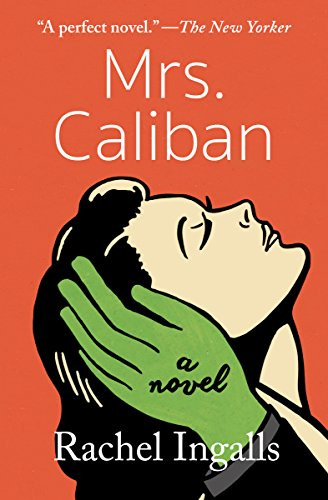
What I Liked: The romance is genuinely adorable. There’s a lot of beautiful language here.
What I Didn’t Like: A lot of that “he told her” instead of putting what was told to someone in dialogue, which makes things very clunky, especially because a lot of pathos for the book ends up that way. The ending gutted me.
Final thoughts: A heartrending book for monsterfuckers everywhere, even if it does have some hiccups.
28. Nobody Knows My Name - James Baldwin
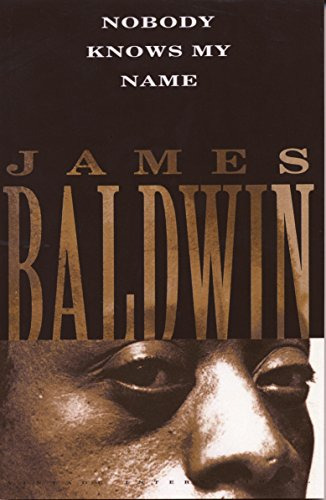
What I Liked: As usual, Baldwin’s prose leaves me speechless. The essay about culture was superb.
What I Didn’t Like: The essays in the later part of the book weren’t as interesting.
Final thoughts: Not my favorite Baldwin work, but nothing he wrote was ever bad.
27. The Celluloid Closet - Vito Russo
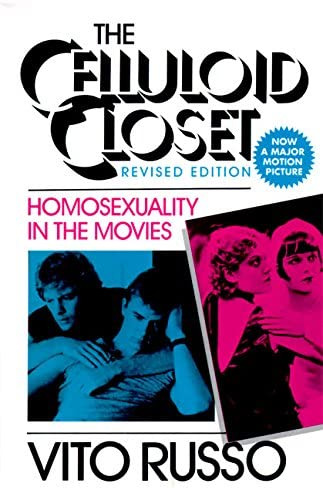
What I Liked: A very interesting topic about a subject that I’m very passionate about (movies and that gay shit). Very poignant analysis. The section about Queen Christina, talking about the scene where she asks if a person can feel nostalgic for a place they’ve never been to - “Similarly, the film Queen Christina created in gay people a nostalgia for something they have never seen onscreen.” - ouch my heart.
What I Didn’t Like: Some of the analysis of some of the movies was laughably bad. Like...Vito Russo, God rest your soul, but did you actually watch The Haunting?
Final thoughts: Not perfect, but a very interesting look into some niche history and cultural study. TW discussions of homophobia.
26. White Fragility: Why It’s So Hard to Talk to White People About Racism - Robin DiAngelo

What I Liked: A very in-depth guide to dealing with a very touchy topic. Even I realized I still have a lot to learn with this.
What I Didn’t Like: Not much if we’re being honest. There’s not a lot that can be critique because it did exactly what it set out to do.
Final thoughts: A great anti-racist tool that everyone needs to read.
#ranking books 2022#an atlas of the difficult world#adrienne rich#mrs. caliban#rachall ingalls#nobody knows my name#james baldwin#the celluloid closet#vito russo#white fragility#robin diangelo
0 notes
Text
White Fragility by Robin DiAngelo
White Fragility by Robin DiAngelo
The simplistic idea that racism is limited to individual intentional acts committed by unkind people is at the root of virtually all white defensiveness on this topic.
Robin DiAngelo, White Fragility
(more…)
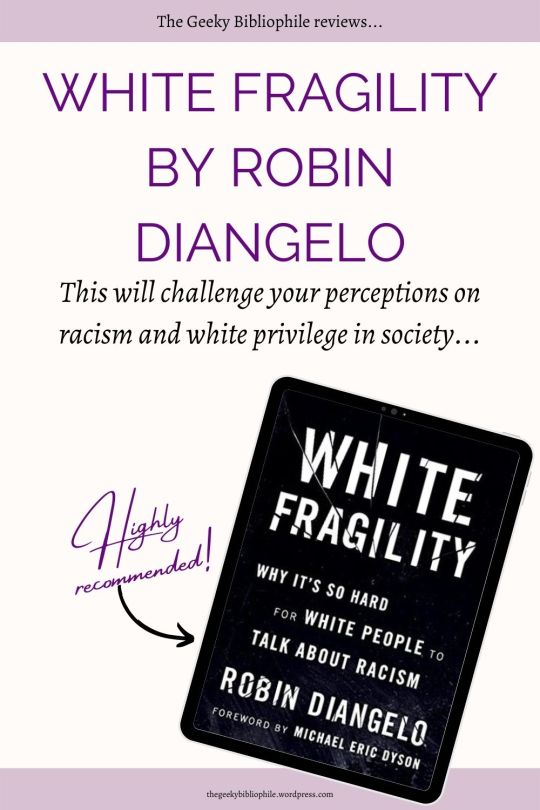
View On WordPress
0 notes
Text
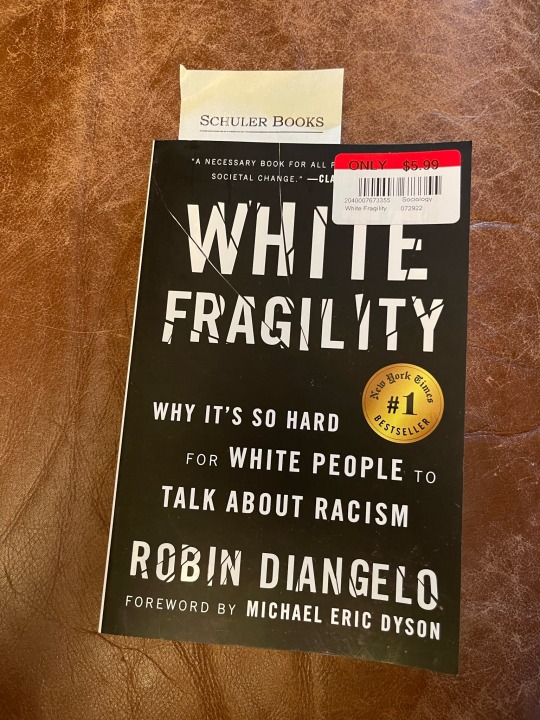
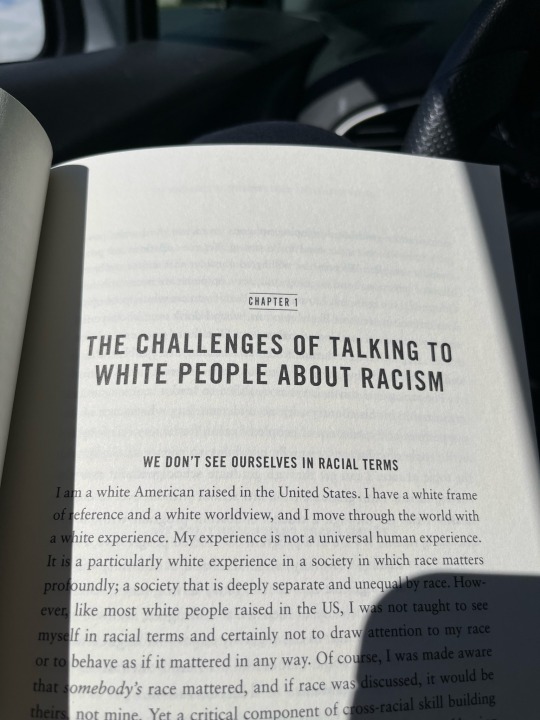
New book alert
Ok so this is one of three books I got from a recent haul at Schuler’s books.
“White Fragility” by Robin DiAngelo
I just started this book, but my social work class this semester has really motivated me to read yet even MORE socially progressive titles.
The more I read, the more radical the books become. Essentially a self narrative from a white woman about why white people can NOT talk about race. Why do we get so defensive? Why do we get so angry just talking about race, racism, and whiteness?
#tomework#book review#book blog#nonfiction#currently reading#radical reads#intersectionality#race and racism#whiteness#white fragility#robin diangelo#why it’s so hard for white people to talk about racism#racism#race
0 notes